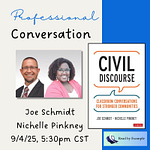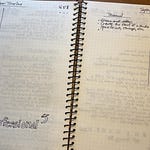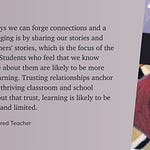In this launch episode, host Matt explores the tension between literacy mandates and the messy reality of school leadership and teaching. Drawing from his experience as a principal and systems coach, Matt introduces the concept of "scripts" in education—from literacy curriculum programs to unwritten cultural rules—and examines how they can both support and constrain professional judgment.
Matt shares why he believes educators need to move beyond being "curriculum deliverers" to reclaim their roles as thoughtful professionals who use resources as guides, not gospel. He outlines the four core themes this series will explore: recovering autonomy, identity, humanity, and agency in literacy education.
Whether you're a classroom teacher feeling overwhelmed by mandates or a leader seeking to balance compliance with authentic learning, this episode offers a framework for going "off-script" in healthy, productive ways that put students first.
Perfect for: Teachers, literacy coaches, and school leaders who want to restore professional wisdom to their practice while working within existing systems.
Join the conversation: Monthly virtual discussions are free for all listeners, with implementation toolkits available for full subscribers.
Duration: [6 minutes]
Official Transcript:
Earlier this month, I along with other coaches and consultants spent two days supporting three district leadership teams. Our goal was to help them develop a strategic improvement plan for the coming school year.
If you've been through this process before, you can imagine the process:
Assess current reality through a data dig
Use systems mapping and root cause tools to identify the most important needs
Select an evidence-based improvement strategy (EBIS) to implement across the organization
It's calming to put together a plan of action. You can see it written out on paper or on a screen. You can imagine the ideal journey that your school will take to achieve the desired results.
And then you begin to imagine all the obstacles that can come up: all the other initiatives currently in place and also asking for your attention; the one teacher team that struggles to hear each other's ideas; the reality of your students arriving and caring little about your agenda as they have their own needs to be met.
Yet even these areas of responsibility can be responsibly addressed with some careful planning.
Too many initiatives? Create a priority list with your leadership team, and break them down into manageable projects and next actions.
Teachers not getting along? Ensure staff meetings and professional learning days explicitly teach collaboration skills, using data and not egos to drive conversations.
Students displaying challenging behaviors? Set up bi-weekly student study meetings with your pupil services team to address these unmet needs with systems of support.
Now we feel even more comforted, more in control.
Having gone down this path for several years as a principal, I can say with confidence that as nice as these plans are, the journey we took as a school never followed these scripts. We have to be adaptive and responsive to the unpredictability of life. That requires a toolbox of skills and resources beyond any plan. As Seth Godin notes, strategic planning has nothing to do with strategy.
And that's what these plans are really, right? Scripts. Actions, settings, and dialogue. They're everywhere in schools when you take a moment to think about it.
The literacy curriculum programs
The mandated and banned instructional practices
The behavior lesson plans for common areas
Some of the scripts aren't written out but are still just as present and powerful. Who you can talk to and trust in a building, and who you cannot. What a school culture celebrates and what is taboo. To veer from the script invites risk: of not belonging, of being ostracized, even when what we want to say aloud supports what's right for each and every child.
I am not entirely against scripts. For example, I often referenced our student handbook when making disciplinary decisions for students. The literacy curriculum resource we purchased and implemented at my last school had lots of culturally relevant texts and authentic tasks. But we used these resources as guides, not gospel. In the end, it was our wisdom, judgment, and sense of professionalism that determined whether we were successful as teachers and leaders.
That's the purpose of this post and future ones within the new series Literacy Unscripted. It's a learning journey to discover how educators like you and me are going off-script in healthy and productive ways. It's an attempt to combat professional erosion to ensure students have access to excellent and engaging learning experiences.
Specific themes I'll be exploring include:
Recovering a Sense of Autonomy - How do we create the conditions for staff and students to make meaningful decisions on behalf of teaching and learning? What opportunities are there within a scripted literacy experience for authentic choice as readers and writers?
Recovering a Sense of Identity - If a mandated literacy program does not adequately represent who students are and can be in our classrooms, where else can they see themselves and the world through text? What moves can faculty make within these constraints to truly serve as teachers and not merely curriculum deliverers?
Recovering a Sense of Humanity - How can we address harmful perspectives perpetuated by insensitive curriculum materials while not stressing ourselves out? How might we leverage our knowledge and position to create life-affirming professional spaces?
Recovering a Sense of Agency - When we see the disparities created by a scripted literacy experience, what tools and mindsets do we need to empower both ourselves and our students to resist? What oversimplified narratives about our students might we challenge through action research and student-led inquiry around meaningful projects and tasks?
These are questions I will be pondering. I hope you will too, by joining me in this podcast series and learning journey.
Here's how you can participate:
Join us for monthly virtual conversations around specific topics related to literacy and leadership. (free for all)
Engage in online professional dialogue through comments and the chat feature. (free for all)
Download an implementation tool kit that will accompany the video recording of our virtual conversations, to use as resources to support your school's PD plan. (full subscribers)
More information to come. Please reach out with any questions you have.
Take care,
Matt









